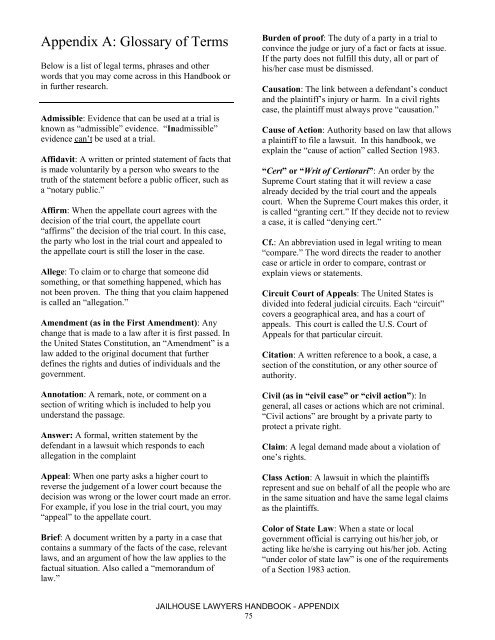Jailhouse Lawyer's Handbook - Sentencing and Justice Reform ...
Jailhouse Lawyer's Handbook - Sentencing and Justice Reform ...
Jailhouse Lawyer's Handbook - Sentencing and Justice Reform ...
You also want an ePaper? Increase the reach of your titles
YUMPU automatically turns print PDFs into web optimized ePapers that Google loves.
Appendix A: Glossary of Terms<br />
Below is a list of legal terms, phrases <strong>and</strong> other<br />
words that you may come across in this <strong>H<strong>and</strong>book</strong> or<br />
in further research.<br />
Admissible: Evidence that can be used at a trial is<br />
known as “admissible” evidence. “Inadmissible”<br />
evidence can’t be used at a trial.<br />
Affidavit: A written or printed statement of facts that<br />
is made voluntarily by a person who swears to the<br />
truth of the statement before a public officer, such as<br />
a “notary public.”<br />
Affirm: When the appellate court agrees with the<br />
decision of the trial court, the appellate court<br />
“affirms” the decision of the trial court. In this case,<br />
the party who lost in the trial court <strong>and</strong> appealed to<br />
the appellate court is still the loser in the case.<br />
Allege: To claim or to charge that someone did<br />
something, or that something happened, which has<br />
not been proven. The thing that you claim happened<br />
is called an “allegation.”<br />
Amendment (as in the First Amendment): Any<br />
change that is made to a law after it is first passed. In<br />
the United States Constitution, an “Amendment” is a<br />
law added to the original document that further<br />
defines the rights <strong>and</strong> duties of individuals <strong>and</strong> the<br />
government.<br />
Annotation: A remark, note, or comment on a<br />
section of writing which is included to help you<br />
underst<strong>and</strong> the passage.<br />
Answer: A formal, written statement by the<br />
defendant in a lawsuit which responds to each<br />
allegation in the complaint<br />
Appeal: When one party asks a higher court to<br />
reverse the judgement of a lower court because the<br />
decision was wrong or the lower court made an error.<br />
For example, if you lose in the trial court, you may<br />
“appeal” to the appellate court.<br />
Brief: A document written by a party in a case that<br />
contains a summary of the facts of the case, relevant<br />
laws, <strong>and</strong> an argument of how the law applies to the<br />
factual situation. Also called a “memor<strong>and</strong>um of<br />
law.”<br />
Burden of proof: The duty of a party in a trial to<br />
convince the judge or jury of a fact or facts at issue.<br />
If the party does not fulfill this duty, all or part of<br />
his/her case must be dismissed.<br />
Causation: The link between a defendant’s conduct<br />
<strong>and</strong> the plaintiff’s injury or harm. In a civil rights<br />
case, the plaintiff must always prove “causation.”<br />
Cause of Action: Authority based on law that allows<br />
a plaintiff to file a lawsuit. In this h<strong>and</strong>book, we<br />
explain the “cause of action” called Section 1983.<br />
“Cert” or “Writ of Certiorari”: An order by the<br />
Supreme Court stating that it will review a case<br />
already decided by the trial court <strong>and</strong> the appeals<br />
court. When the Supreme Court makes this order, it<br />
is called “granting cert.” If they decide not to review<br />
a case, it is called “denying cert.”<br />
Cf.: An abbreviation used in legal writing to mean<br />
“compare.” The word directs the reader to another<br />
case or article in order to compare, contrast or<br />
explain views or statements.<br />
Circuit Court of Appeals: The United States is<br />
divided into federal judicial circuits. Each “circuit”<br />
covers a geographical area, <strong>and</strong> has a court of<br />
appeals. This court is called the U.S. Court of<br />
Appeals for that particular circuit.<br />
Citation: A written reference to a book, a case, a<br />
section of the constitution, or any other source of<br />
authority.<br />
Civil (as in “civil case” or “civil action”): In<br />
general, all cases or actions which are not criminal.<br />
“Civil actions” are brought by a private party to<br />
protect a private right.<br />
Claim: A legal dem<strong>and</strong> made about a violation of<br />
one’s rights.<br />
Class Action: A lawsuit in which the plaintiffs<br />
represent <strong>and</strong> sue on behalf of all the people who are<br />
in the same situation <strong>and</strong> have the same legal claims<br />
as the plaintiffs.<br />
Color of State Law: When a state or local<br />
government official is carrying out his/her job, or<br />
acting like he/she is carrying out his/her job. Acting<br />
“under color of state law” is one of the requirements<br />
of a Section 1983 action.<br />
JAILHOUSE LAWYERS HANDBOOK - APPENDIX<br />
75





